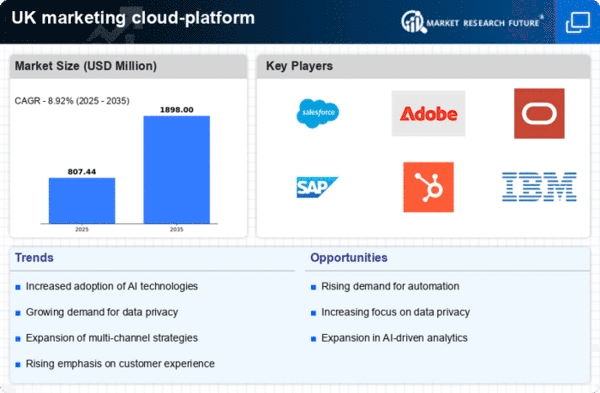Rising Demand for Omnichannel Marketing
The marketing cloud-platform market is experiencing a notable surge in demand for omnichannel marketing solutions. Businesses in the UK are increasingly recognising the necessity of delivering a seamless customer experience across various channels, including social media, email, and mobile applications. This trend is driven by the growing consumer expectation for consistent messaging and engagement. According to recent data, approximately 70% of UK marketers believe that an integrated approach enhances customer satisfaction. As a result, marketing cloud platforms that offer robust omnichannel capabilities are likely to see increased adoption, thereby propelling growth in the market.
Shift Towards Data-Driven Decision Making
In the marketing cloud-platform market, there is a pronounced shift towards data-driven decision making among UK businesses. Companies are increasingly leveraging analytics and insights to inform their marketing strategies, aiming to optimise campaign performance and ROI. Recent statistics indicate that around 65% of UK marketers utilise data analytics tools to guide their marketing efforts. This trend underscores the importance of marketing cloud platforms that provide advanced analytics features, enabling businesses to harness data effectively. Consequently, the demand for such platforms is expected to rise, further stimulating growth in the marketing cloud-platform market.
Increased Regulatory Compliance Requirements
The marketing cloud-platform market is significantly influenced by the increasing regulatory compliance requirements in the UK. With the implementation of stringent data protection laws, such as the General Data Protection Regulation (GDPR), businesses are compelled to adopt marketing solutions that ensure compliance. This has led to a heightened demand for marketing cloud platforms that incorporate robust security features and data management capabilities. It is estimated that compliance-related investments in marketing technologies could reach £1 billion by 2026. Consequently, platforms that prioritise compliance are likely to see enhanced adoption, shaping the future landscape of the marketing cloud-platform market.
Emergence of Advanced Marketing Automation Tools
The marketing cloud-platform market is experiencing a significant transformation with the emergence of advanced marketing automation tools. UK businesses are increasingly recognising the efficiency and effectiveness of automating marketing processes, from lead generation to customer engagement. Recent surveys indicate that approximately 60% of UK marketers utilise automation tools to streamline their operations. This trend is likely to continue, as automation not only reduces operational costs but also enhances campaign effectiveness. As a result, marketing cloud platforms that offer sophisticated automation features are expected to thrive, contributing to the overall growth of the marketing cloud-platform market.
Growing Emphasis on Customer Experience Management
The marketing cloud-platform market is witnessing a growing emphasis on customer experience management (CEM) as businesses strive to enhance customer satisfaction and loyalty. In the UK, organisations are increasingly investing in technologies that facilitate personalised interactions and improve overall customer journeys. Research suggests that companies focusing on CEM can achieve up to a 20% increase in customer retention rates. As a result, marketing cloud platforms that offer comprehensive CEM tools are likely to gain traction, driving further expansion in the market. This trend reflects a broader recognition of the value of customer-centric strategies in achieving business success.
















